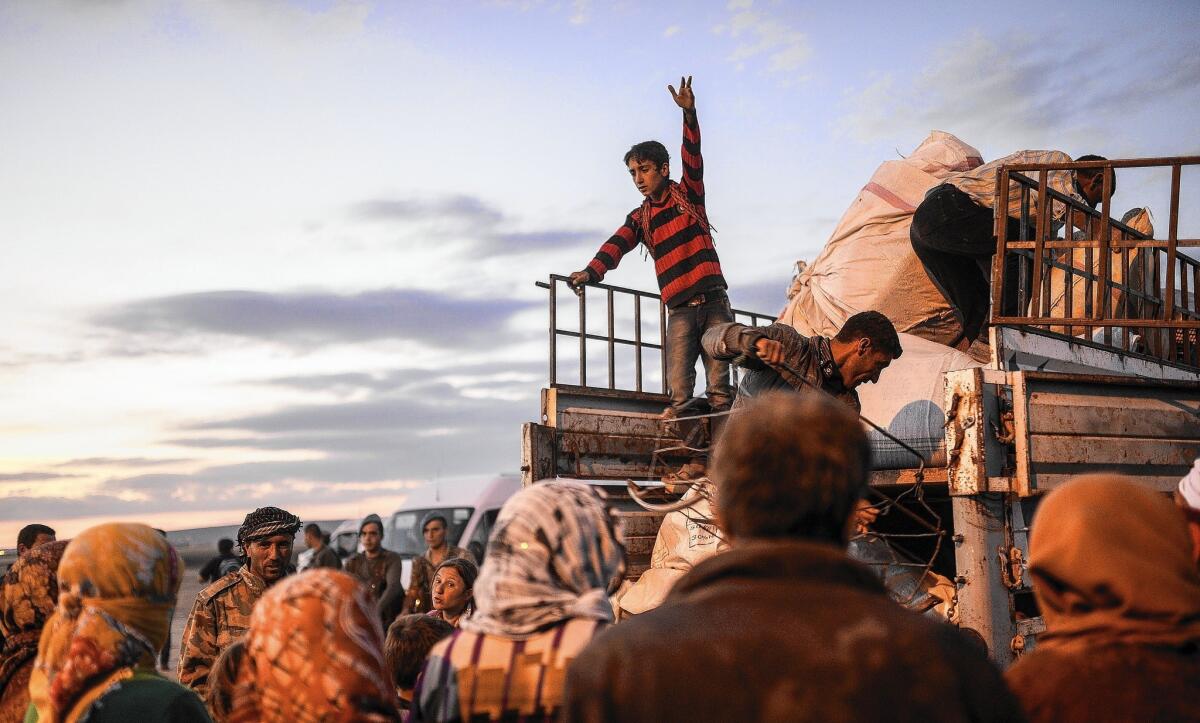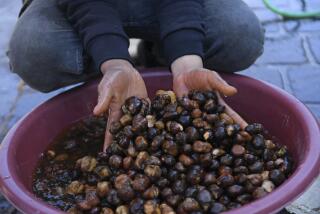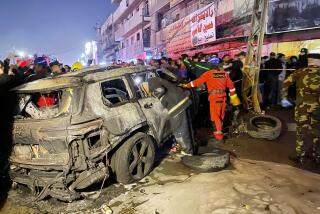Kurdish Iraqi forces take border town from Islamic State

Iraqi Kurdish forces have captured a strategic town along the border with Syria as part of an offensive against Islamist militants in northern Iraq, the Kurdish military command said Tuesday.
Kurdish troops known as peshmerga overran Rabia, a border town facing Syria that had been in the hands of Islamic State militants, the Kurds said.
“We are leaving their bodies behind and picking up their abandoned weapons,” a peshmerga commander, Ahmad Mohamad, told the Kurdish news site Rudaw.
The capture of Rabia constrains the cross-border mobility of the Al Qaeda offshoot group, also known as Islamic State of Iraq and Syria, or ISIS, which has declared a “caliphate” across a broad swath of Iraq and neighboring Syria. The group frequently moves fighters and weapons between the two nations and has declared its intention to erase the border. Despite the loss of Rabia, the militants still hold sway over vast stretches of the Syrian-Iraqi frontier.
Islamic State forces were still advancing at another border about 200 miles to the west, along the Syrian-Turkish frontier. The militants were reported to be closing in from three sides on the Syrian town of Ayn al-Arab, known as Kobani in Kurdish, just south of Turkish territory.
Much of Kobani’s population, mostly Syrian Kurds, has fled to Turkey, fearing an “ethnic cleansing” campaign by the advancing Sunni Arab extremists. About 150,000 Syrians have entered Turkey from the Kobani area in the last two weeks.
Islamic State forces have been shelling Kobani from positions outside the town, causing casualties. Video from the town Tuesday showed empty streets and shuttered shops.
Defending Kobani are Syrian Kurdish militiamen, who say they are outgunned by the extremist forces. But the besieged Syrian Kurds are receiving some high-tech air support from the United States.
The Pentagon said Tuesday that 11 new airstrikes in Syria included three in the Kobani area, targeting militant artillery and rocket launchers. It was at least the second time that U.S. forces had struck near Kobani since the Obama administration launched air attacks last week on Islamic State positions in Syria.
How much the aerial bombardment was helping to blunt the extremist advance on Kobani was not clear.
“The airstrikes are not precise,” said Walat Bakir, a Kobani resident reached via telephone, who noted that militant units were dispersing to decrease their vulnerability. “ISIS is not stupid. They are not going to stay in their headquarters while they are being attacked.”
Hundreds of Kurds in Turkey have reportedly headed south to join their kin in the fight. Periodic clashes have broken out between Kurdish civilians and Turkish troops policing the border. Turkish forces have used tear gas to disperse the crowds and have deployed tanks along the isolated border area. The Turkish government has long had a strained relationship with its Kurdish minority.
In Iraq, meantime, the Iraqi Kurdish peshmerga reported advances against Islamic State south of the oil-hub city of Kirkuk, which is in Kurdish hands, and close to the contested northwestern town of Zumar. For weeks, Kurdish forces have met fierce resistance from militants in Zumar, which is situated northwest of Mosul, Iraq’s second-largest city and an Islamic State stronghold.
The latest thrusts by Kurdish forces are part of a campaign to regain territory lost to militants in August, when peshmerga fighters made a hasty and humiliating retreat in the face of the extremist onslaught. A U.S.-led bombing campaign launched in mid-August has helped peshmerga and largely Shiite Iraqi government forces regain some lost ground.
On Tuesday, British authorities said the Royal Air Force had conducted its first strikes against Islamic State positions in Iraq, destroying a heavy weapons post and an armed pickup truck.
The Pentagon said Tuesday that the U.S. conducted seven more airstrikes across northwestern Iraq, destroying militant armed vehicles and a checkpoint.
Abdulrahim reported from Irbil and McDonnell from Beirut.Twitter: @mcdneville
More to Read
Start your day right
Sign up for Essential California for news, features and recommendations from the L.A. Times and beyond in your inbox six days a week.
You may occasionally receive promotional content from the Los Angeles Times.







